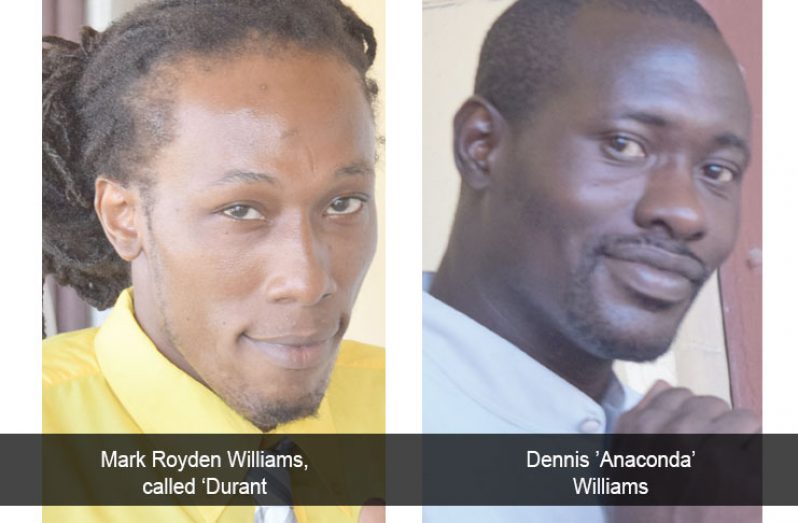…questions raised over status of parliamentary consultations
With the recent sentencing to ‘death by hanging’ of two condemned high-profile mass killers by Justice Roxanne George, the number of persons on death row has moved up to 25 and acting Director of Prisons (DoP), Gladwin Samuels said the Guyana Prison Service (GPS) is ready to execute the death penalty as long as President David Granger signs the order. But there is a moratorium in place since 1997 and the President himself has made it clear he has no intention of taking anyone’s life.
Human rights activists continue to be angered by judges here who hand down death sentences and have railed against successive governments for still having capital punishment on the law books. Guyana is also party to the International Covenant on Civil and Political Rights (ICCPR). Article 6 protects the right to life. It does not make the death penalty illegal, but it imposes a treaty obligation on states to proceed to complete abolition of the death penalty. President Granger made it clear last year that he does not intend to sign the order of execution of any prisoner, even though no concrete decision has yet been made as to whether his government intends to abolish the death penalty.
“I don’t have any intention of executing anyone…some members feel that the death penalty is a deterrent, some members feel that it is not a deterrent. But David Granger doesn’t have any intention of approving the execution of anyone.” The President also stated that “There is no single statement out of the government on whether it will abolish the death penalty or not. In due course, we will arrive on a position.” High Court Judges continue to hand down death sentences.
Parliamentary consultations
Last week’s sentence also brings into question the status of an August 9, 2012, Parliamentary Special Select Committee Resolution, which speaks to the abolition of corporal punishment in schools; the abolition of the death penalty; and the decriminalisation of consensual adult same sex relations and discrimination against Lesbians, Gays, Bi-sexual and Transgender persons. The Committee at the time comprised of Chairperson, Ms. Jennifer Webster, M.P., Dr. Leslie Ramsammy, M.P., Ms. Carolyn Rodrigues Birkette, M.P., Ms. Gail Teixeira ,M.P., Dr. Rupert Roopnaraine, M.P., Ms. Volda Lawrence, M.P., Ms. Afirco Selman, M.P., Mr. Renis Morrian, M.P., and Ms. Catherine Hughes, M.P.
Its work was to determine the attitude of Guyanese, especially parents and children, to corporal punishment and its possible abolition; the attitude of Guyanese, particularly the families of victims, criminologists, and professionals, on capital punishment and its possible abolition; and the attitude of Guyanese of any changes in legislative provisions and the criminal code regarding consensual adult same sex relationships and discrimination, perceived or real, against Lesbians, Gays, Bi-Sexual and Transgender persons.
The action by the then Parliament had stemmed from Guyana’s appearance before the United Nations Human Rights Council (UNHRC) during the first cycle of the Universal Periodic Review (UPR) in May, 2010 and again in September, 2010. At the conclusion of its review, Guyana received several recommendations and committed itself to consult on three main matters that may be considered controversial in Guyanese society, namely the abolition of corporal punishment, the abolition of the death penalty and the decriminalization of consensual adult same sex relations and discrimination against Lesbians, Gays, Bi-sexual and Trans-gender persons, with a view to garnering public sentiment which may lead to legislative changes.
Meanwhile, on Thursday last, Mark Royden Williams, called ‘Durant’ and ‘Smallie’; and Dennis Williams, called ‘Anaconda,’ were each sentenced seven times to death by hanging after a jury found them guilty of 7 counts of murder. They were also found guilty on five counts of manslaughter and sentenced additionally to life imprisonment.
The two men were part of the most notorious gang in Guyana’s history led by Rondell Rawlins called ‘Fine Man’, which invaded the mining community of Bartica on February 17, 2008, and murdered Lance Corporal Zaheer Zakir, and Constables Shane Fredericks and Ron Osborne, Edwin Gilkes, Dexter Adrian, Irving Ferreira, Deonarine Singh, Ronald Gomes, Ashraf Khan, Abdool Yasseen, Errol Thomas, and Baldeo Singh.
Some members of the gang were also fingered in the execution of 11 persons – including five children – when they stormed Lusignan Pasture, East Coast Demerara, on the morning of Saturday, January 26, 2008, armed with high-powered machine guns. Armed with AK-47s and shotguns, they entered Lusignan around 2:00 am, and invaded the homes of five families, killing the occupants within 20 minutes. Those shot dead were Clarence Thomas, 48, Vanessa Thomas, 12, Ron Thomas, 11, Mohandan Goordat, 32, Seegopaul Harilall, 10; Seegobin Harilall, 4; Dhanwajie Ramsingh, 52; Seecharran Rooplall, 56; Raywattie Ramsingh, 11; Shazam Mohammed, 22; and Shaleem Baksh, 52.
Samuels, told reporters in an invited comment Monday that the decision to execute by hanging lies in the power of President Granger and though Guyana has signed on to a convention the death penalty is still an option that is available. “This convention that the government has signed on to, there is some degree of resistance or lack of use of the death penalty. However it is still an option that is available. If the president decides that he is, gonna enforce the death penalty, that’s all that is needed,” Samuels told the press.
According to Samuels the hanging of those persons sentenced to death who would have exhausted their rights to appeal, will be carried out if the President signs the order of execution. “So those persons who are sentenced to death, provided that they would have exhausted their rights to appeal and their death sentence is confirmed, the President at any one time can sign the order of execution and it will have to be carried out.” However, if such orders are not given prisoners on death row will remain there for the rest of their lives, and will be treated in keeping with the laws and guidance outlined for ‘death sentence’ prisoners.












